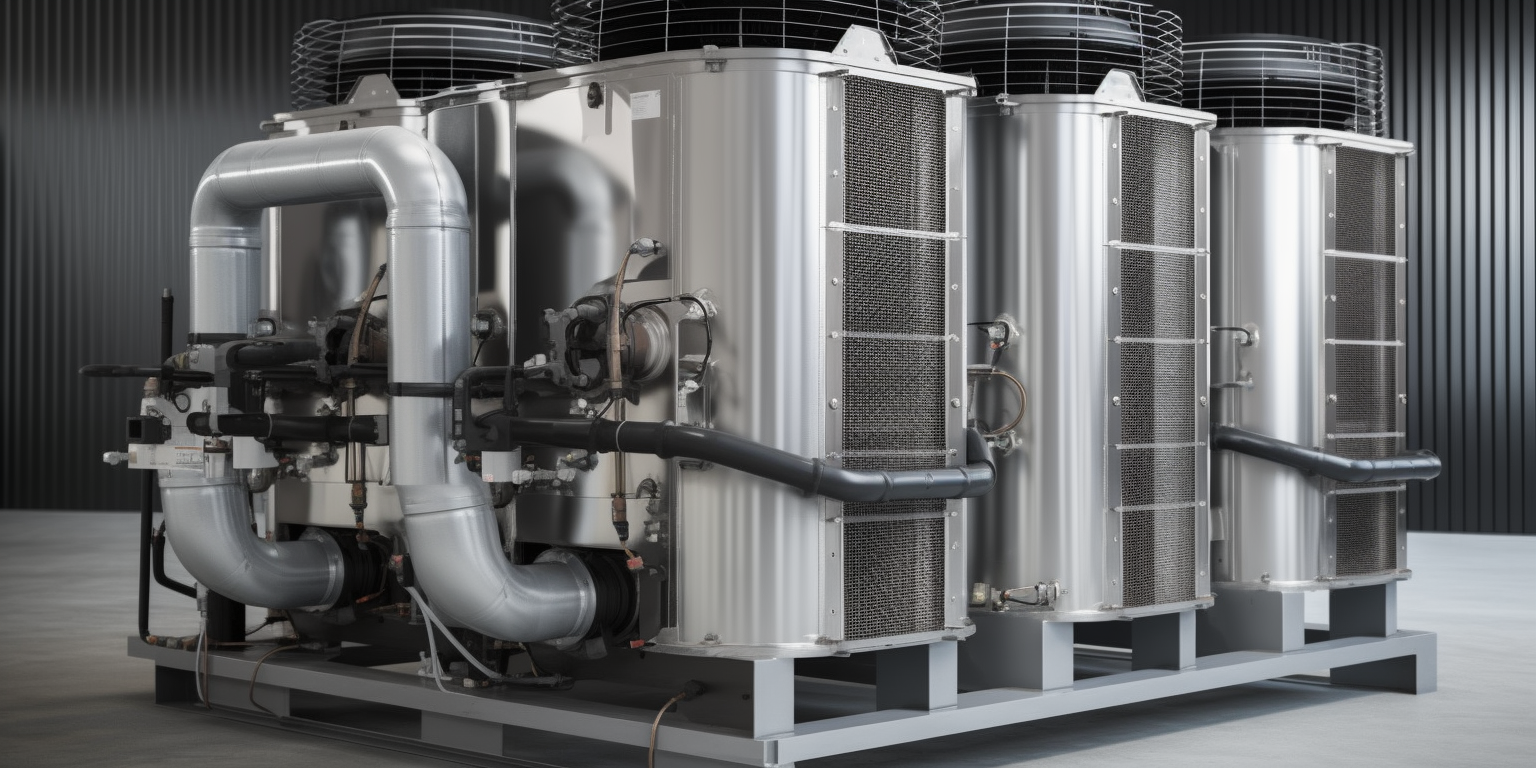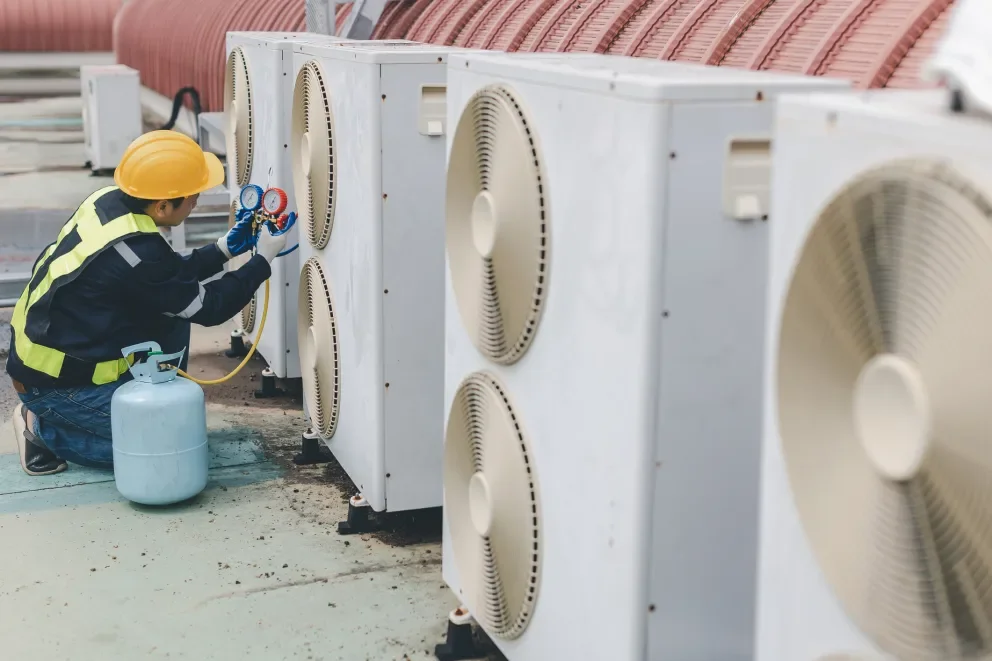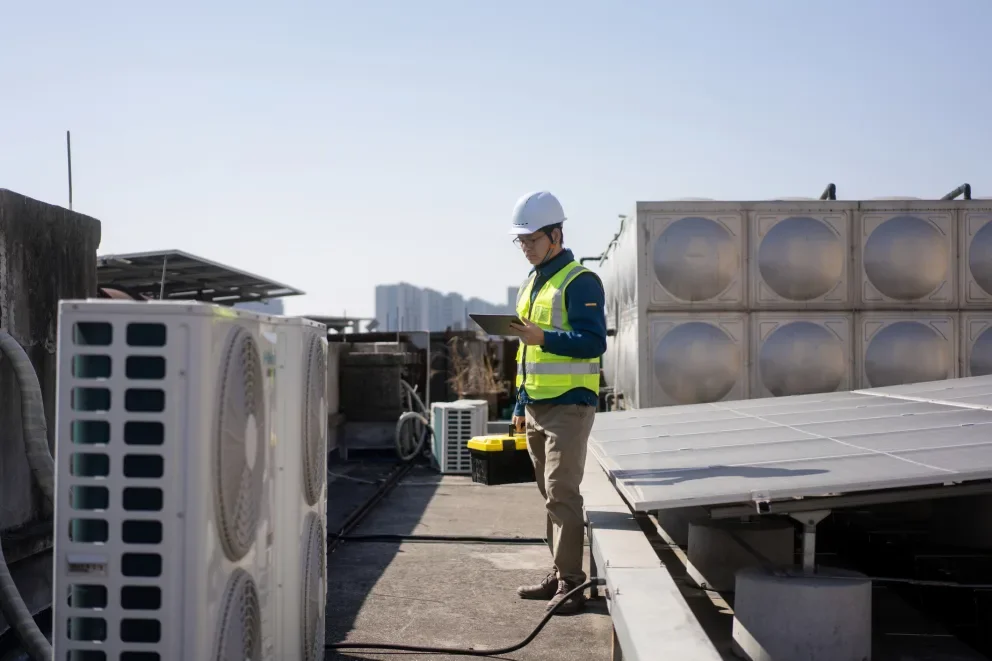An evaporative condenser is a key component in commercial and industrial refrigeration systems. It functions as an efficient heat rejection device that combines the cooling performance of a condenser with the evaporative cooling process. Here’s how it works:
The evaporative condenser circulates a refrigerant inside a coil, which is sprayed with water. Simultaneously, air is drawn up over the coil by a fan. As the warm refrigerant in the coil comes into contact with the cold water spray, it cools down and condenses back into a liquid state. This process is known as evaporative cooling.
This ingenious system offers significant benefits. For starters, it requires less space compared to traditional air-cooled or water-cooled condenser systems. It also proves more energy-efficient as the evaporation process allows the system to reject more heat with less energy. Furthermore, it reduces the amount of water needed compared to conventional cooling tower systems, making it an environmentally friendly choice.
In industrial settings, evaporative condensers are commonly used in applications like cold storage, food and beverage manufacturing, and other fields where refrigeration is critical. These systems keep products at the right temperature, ensuring their quality and longevity.
So, the next time you enjoy a cold drink or a delicious frozen dessert, remember it’s the often-overlooked evaporative condenser working behind the scenes, keeping things cool!
What are the benefits of using an evaporative condenser in refrigeration processes?
An evaporative condenser is an incredible piece of technology that can significantly improve refrigeration processes. To begin with, it’s an all-in-one solution that combines the functions of a cooling tower and a condenser, simplifying the overall system. By consolidating these components, an evaporative condenser reduces installation space requirements, providing a real advantage in facilities where space is at a premium.
What makes this system even more impressive is its energy efficiency. An evaporative condenser uses the natural process of evaporation to cool the refrigerant, which consumes less energy than traditional methods. This means lower operational costs and a smaller carbon footprint, making it a fantastic choice for businesses seeking to go green.
Furthermore, the evaporative condenser shines in its capacity to maintain optimal refrigeration temperatures even under high ambient conditions. This ensures the reliable and consistent performance of the entire refrigeration system, a critical factor for industries such as food processing and storage, where precise temperature control is paramount.
Lastly, this system has the benefit of being easy to maintain. It features fewer moving parts than other types of cooling systems, reducing the likelihood of mechanical issues and downtime.
Choosing an evaporative condenser for your refrigeration process offers a host of advantages, from saving space and energy to providing consistent cooling and facilitating easy maintenance. It’s a choice that not only benefits your operations but also contributes positively to the environment.
How does an evaporative condenser contribute to energy efficiency in refrigeration?
An evaporative condenser is a game-changer when it comes to energy efficiency in refrigeration. Here’s how it works. It efficiently cools down gas and turns it back into a liquid by leveraging the process of evaporation. This simple yet effective process starts when hot, pressurized refrigerant gas flows into the condenser. As water cascades over the coil, it absorbs the heat, causing the refrigerant gas to cool and convert back to a liquid.
But here’s the kicker. The evaporative condenser doesn’t just cool the refrigerant; it also cools the surrounding air. This means that the system doesn’t have to work as hard to maintain optimal temperatures, translating into significant energy savings.
What’s more, the evaporative condenser has a higher condensing capacity, which allows it to handle larger refrigeration loads with minimal energy consumption. This, in turn, reduces costs for businesses, making evaporative condensers an economical choice.
Evaporative condensers are a powerful ally in the quest for energy efficiency. They harness natural processes to cool refrigerant and air, optimize the performance of refrigeration systems, and offer substantial savings on energy and operational costs. So next time you switch on that refrigerator, take a moment to appreciate the hard-working evaporative condenser that’s keeping things cool behind the scenes.
What factors should be considered when choosing an evaporative condenser for a refrigeration system?
When shopping for an evaporative condenser for your refrigeration system, there are several key factors to consider. First and foremost, you must look at the condenser’s capacity. It’s essential to choose a condenser that meets your system’s specific cooling demands.
Next, consider the condenser’s energy efficiency. An energy-efficient model will not only reduce your carbon footprint but also save you money on utility bills in the long run. Look for models with energy-saving features such as variable speed fans or high-efficiency coils.
Thirdly, weigh the material and build quality of the condenser. Opt for durable materials like stainless steel that can resist corrosion and withstand harsh weather conditions. Moreover, the design should allow for easy maintenance and cleaning to ensure optimal performance and longevity.
Furthermore, evaluate the condenser’s noise level. While this may seem trivial, a quiet unit makes for a more pleasant working environment, especially if the system is located near workspaces or residential areas.
Lastly, don’t underestimate the importance of choosing a trusted manufacturer. Reliable manufacturers will provide comprehensive warranty coverage, and their products are more likely to offer superior performance and durability.
By considering these factors, you’ll be well on your way to selecting the right evaporative condenser for your refrigeration system. Remember, the best choice is one that fits your specific needs and offers the best balance of performance, efficiency, and cost-effectiveness.
What are the common issues or problems that can occur with an evaporative condenser and how can they be resolved?
An evaporative condenser can encounter a variety of issues. First off, scale formation is a common predicament, caused by the accumulation of minerals in the water. This build-up can lead to decreased efficiency and a higher risk of equipment failure. To combat this, regular water treatment and condenser cleaning are vital.
Another problem you might come across is algae growth, which not only affects the condenser’s performance but can also cause health concerns. Algae thrive in moist environments like condensers so it’s crucial to maintain proper hygiene and use effective biocontrols.
Overheating is another frequent issue, which can lead to system shutdowns. This often stems from poor maintenance or improper installation. Regular checks, ensuring the condenser is properly installed, and routine maintenance can help prevent this.
It’s also not uncommon for evaporative condensers to suffer from water and refrigerant leaks due to wear and tear or faulty components. Regular checks can help detect these early and fix them before they escalate.
Inadequate air circulation, mainly due to blockages or fan issues, can also affect the condenser’s performance. To resolve this, make sure to keep the air pathways clear and check the fan regularly.
Finally, cold weather can cause freeze-ups, resulting in system damage. Proper winterization of the system can prevent this.
How can the lifespan of an evaporative condenser be extended?
An evaporative condenser is a key asset in many industrial processes, and prolonging its lifespan can significantly cut costs and enhance efficiency. Regular maintenance is the first step in ensuring its longevity. This involves routinely checking the unit for leaks, ensuring the water treatment systems are functioning correctly, and verifying the fan and pump operations.
Cleaning the condenser is another important aspect. Any build-up of dirt or scale can hinder the unit’s performance, causing it to work harder than necessary. Regularly scheduled cleanings can keep the condenser working at peak efficiency.
The water quality used in the condenser also plays a crucial role in its lifespan. Water containing high mineral content or contaminants can cause scale build-up, leading to reduced efficiency and potential damage. Using water treatment solutions or sourcing high-quality water can help mitigate these issues.
Additionally, consider investing in protective coatings for your evaporative condenser. These coatings can protect against corrosive elements, enhancing the condenser’s durability and extending its lifespan.
Lastly, monitor the unit’s performance regularly. This proactive approach can help spot potential issues early before they become costly repairs. Utilizing technology to monitor the unit’s performance can make this task more manageable, providing real-time data and insights.
By implementing these practices, you’ll boost the lifespan of your evaporative condenser, ensuring it remains an asset to your industrial process for years to come.
What are the safety measures that need to be followed while operating an evaporative condenser?
Operating an evaporative condenser requires adhering to certain safety measures to ensure smooth and safe operation. First and foremost, it’s essential to conduct routine checks and maintenance. This isn’t just to keep the system running efficiently, but also to identify potential safety risks early.
Closely monitor the water treatment system. Poor water quality can cause scaling and corrosion, posing safety risks. Therefore, maintain a well-operated water treatment system to prevent such issues.
Always wear personal protective equipment (PPE) when dealing with the unit. As evaporative condensers deal with refrigerants, exposure to these can cause health risks. Wearing appropriate PPE like safety goggles, gloves, and proper footwear can mitigate these risks.
Furthermore, ensure the condenser is installed in a well-ventilated area. Since it works on the principle of evaporation, good ventilation is key to its safe operation.
Lastly, improper shutdown or startup sequences can cause dangerous situations. Always follow the manufacturer’s instructions for these procedures.
Remember, safety comes first. Following these measures will not only ensure the longevity of your evaporative condenser but also safeguard those operating it.
How can software aid the maintenance of Evaporative Condensers?
Modern software technologies can significantly enhance the maintenance of evaporative condensers. By integrating software systems into your maintenance routine, you can proactively monitor the performance and efficiency of your equipment. These software tools offer real-time data tracking, providing vital insight into the operating status and performance levels of your evaporative condenser.
For instance, software can help in predicting when maintenance is needed, preventing unexpected system failures and reducing downtime due to repairs. By analyzing the data gathered, these tools can notify you of any irregularities or changes in the performance of the evaporative condenser. This allows for timely intervention, ensuring the longevity and optimal functionality of your equipment.
Additionally, with the integration of software, scheduling routine maintenance becomes effortless. Automated reminders and scheduling tools ensure that regular checks and necessary cleanings are never missed, contributing to the overall efficiency and durability of your evaporative condenser.
Lastly, software can provide comprehensive reporting on the performance of your evaporative condenser. It can generate detailed reports on energy consumption, cooling capacity, and system efficiency, enabling you to make informed decisions about your equipment and its operation.
Introducing software into your evaporative condenser maintenance routine can result in improved efficiency, increased longevity, and reduced operational costs. It’s a simple, user-friendly approach to make your evaporative condenser maintenance more effective and reliable.
Key Takeaways:
- Regular maintenance and cleaning are essential to extending the lifespan of an evaporative condenser.
- Water quality significantly affects the performance and lifespan of the unit; using high-quality water or water treatment solutions can help.
- Protective coatings can safeguard the condenser against corrosive elements, thereby enhancing its durability.
- Safety measures, including routine checks, use of personal protective equipment, and proper installation, should always be observed when operating an evaporative condenser.
- Modern software technologies can assist in proactive system monitoring, predictive maintenance, and detailed performance reporting, thereby enhancing the maintenance and efficiency of evaporative condensers.



